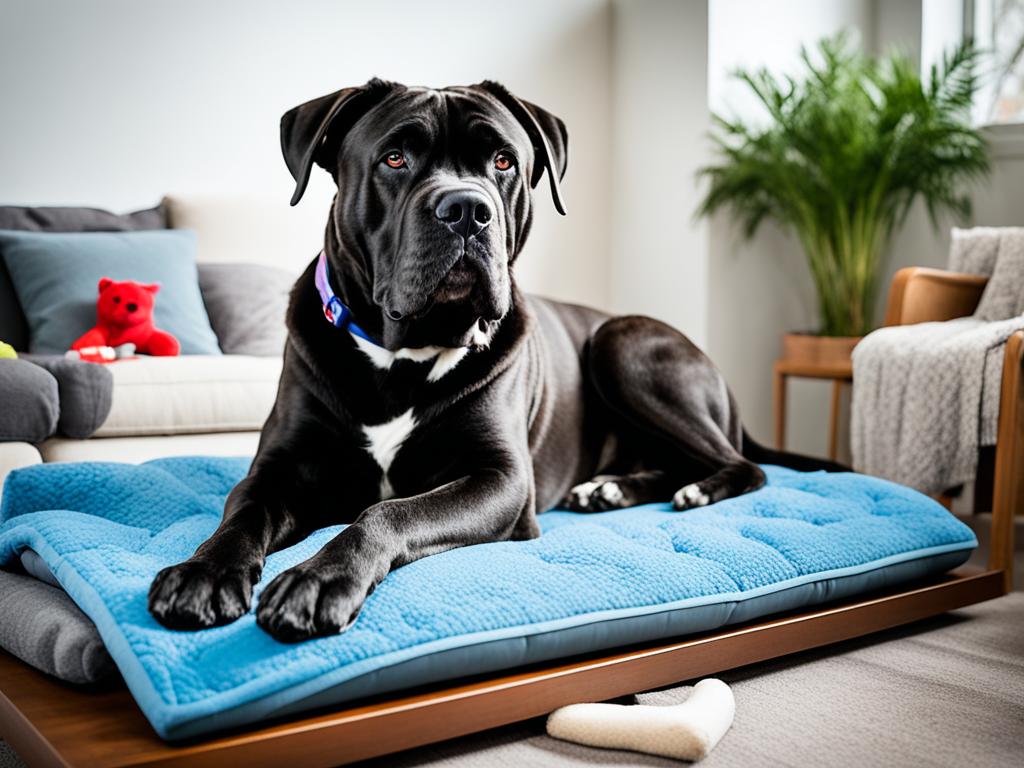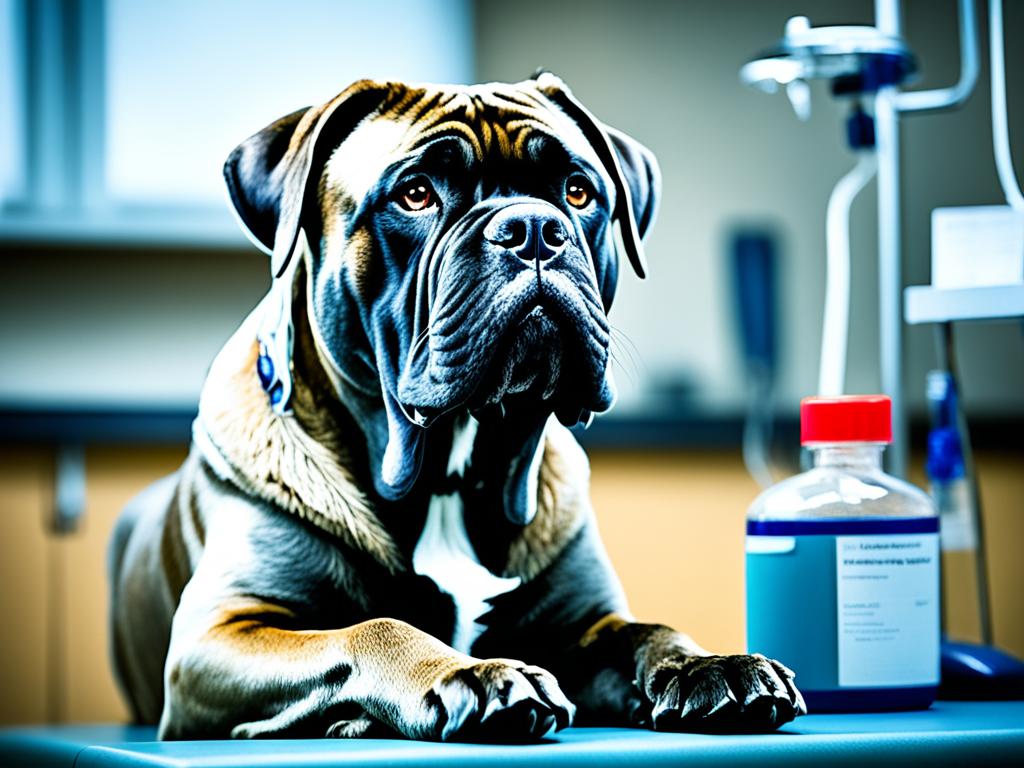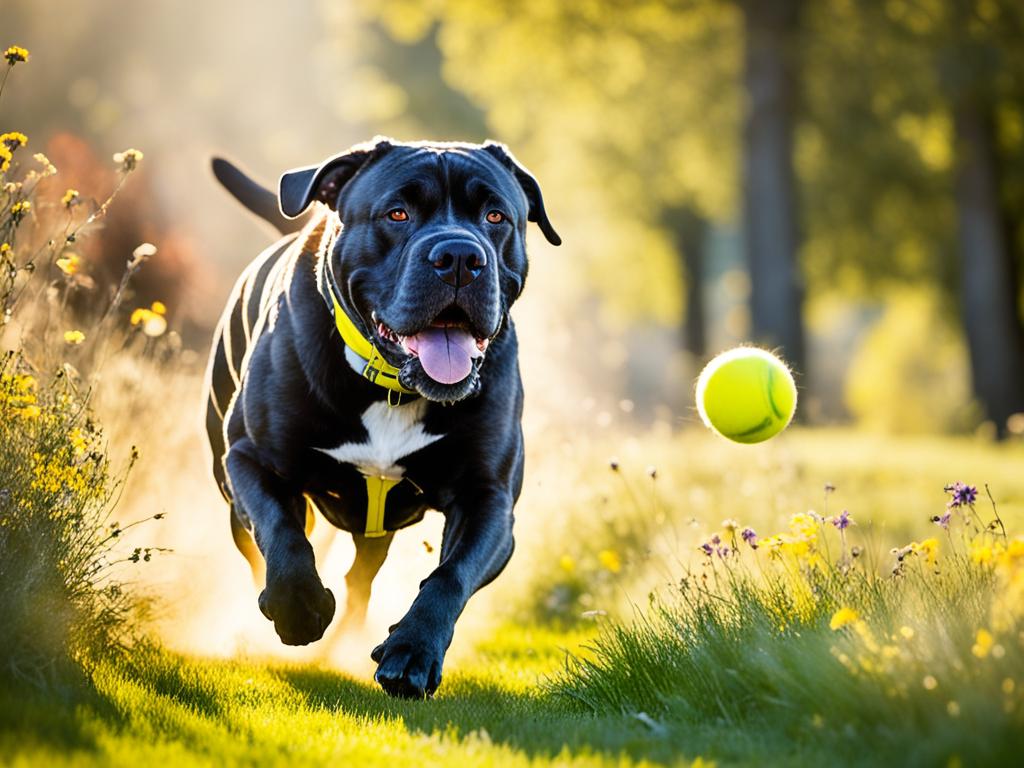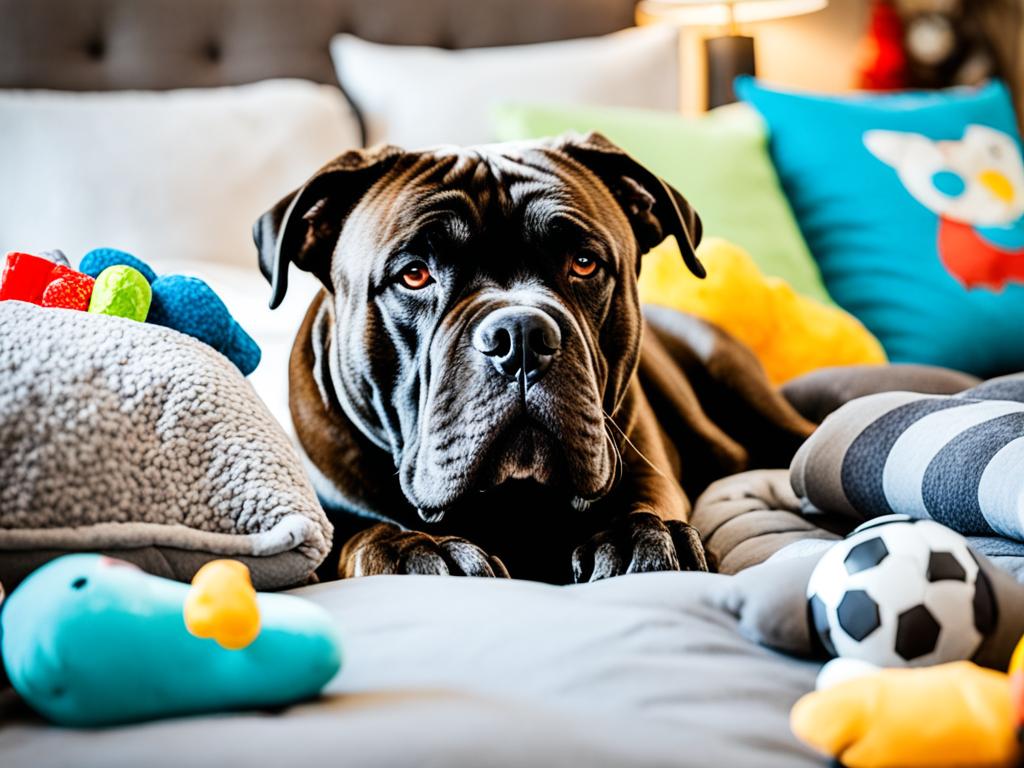Did you know that compared to their smaller counterparts, large dog breeds like the Cane Corso tend to enter their senior years earlier, often around the age of five to six? This means that the journey through old age can encompass a greater portion of their lives, making senior dog care an extended commitment for owners. Tailoring elderly Cane Corso care to their evolving needs is essential for optimizing their well-being during these golden years. As majestic as they are in their youth, aging Cane Corsos require attentive adjustments in their health regimen to maintain their noble stature and quality of life well into old age.
Understanding the intricate details of senior Cane Corso care brings multiple benefits, including proactive management of joint health, adaptations in daily routines to enhance comfort, and dietary considerations that address the aging canine’s metabolism. By educating ourselves on the best practices of care, owners can significantly influence the happiness and healthspan of these affectionate giants.
Key Takeaways
- Understanding large breed aging to provide timely care for senior Cane Corsos.
- Benefits of specialized supplements like glucosamine and Omega-3 fatty acids in supporting Cane Corso health in old age.
- The importance of a balanced diet rich in protein and fiber for your aging Cane Corso’s digestive health and muscle maintenance.
- How low-impact exercises can preserve mobility and joint health in senior Cane Corsos.
- Why regular veterinary check-ups are crucial for early detection and management of age-related conditions.
- Creating a comfortable and accessible living environment that caters to an elderly Cane Corso’s needs.
- Implementing strategies for mental stimulation to enrich the lives of senior dogs.
Understanding the Aging Process in Cane Corsos
As the noble Cane Corso enters its golden years, it’s essential for pet owners to recognize the natural changes that this majestic breed will undergo. Understanding these transformations is the first step towards providing the best care for a senior Cane Corso, ensuring they maintain the highest quality of life even as they slow down.
Recognizing the Signs of Aging in Your Cane Corso
Visible signs of aging in your Cane Corso can be gradual, but being attentive can help you cater to their evolving needs. Reduced activity levels are commonly observed alongside a slower gait, indicating possible joint discomfort. These changes warrant a gentle approach to their physical activities and living arrangements.
Common Age-Related Health Concerns in Senior Cane Corsos
Senior Cane Corso health concerns are not unlike other large breeds, predisposed to certain age-related conditions. Owners should be vigilant for symptoms of hip dysplasia, gastric dilatation-volvulus (bloat), and cardiac issues—all ailments that can affect the senior Cane Corso’s health and wellness.
| Condition | Symptoms | Management |
|---|---|---|
| Hip Dysplasia | Limping, difficulty rising | Weight management, joint supplements |
| Gastric Dilatation-Volvulus | Drooling, swollen abdomen | Dietary adjustments, smaller meals |
| Cardiac Issues | Exercise intolerance, coughing | Medications, modified exercise |
Adjusting Your Care to Match Your Cane Corso’s Age
Adapting to caring for older Cane Corso means integrating moderate exercise to maintain muscle tone and joint health while also ensuring mental stimulation to combat cognitive decline. Don’t forget the importance of regular veterinary check-ups, a comfortable living environment, and dietary changes that respect the needs of your aging companion.
- Provide orthopedic bedding for restful sleep and joint support.
- Consider mobility aids for ease of movement around the house.
- Incorporate mentally stimulating toys and activities to keep their mind engaged.
Senior Cane Corso Care: Dietary Needs
Nutrition plays a pivotal role in the health of senior Cane Corsos, with specific dietary requirements that must be met to ensure their well-being as they age. Tailored diets and supplements are essential components of senior pet care for Cane Corso, aiming to prevent obesity, support joint health, and address the needs of a slowing metabolism.
Selecting the Right Food for Elderly Cane Corso Care
Selecting the right food for your aging Cane Corso involves finding a balance between satisfying taste preferences and meeting nutritional needs. It’s crucial to opt for dog food that features high-quality proteins, reduced calorie content, and easy-to-digest ingredients—a combination that helps maintain muscle mass without contributing to weight gain.
Supplementing Your Cane Corso’s Diet for Optimal Health
Alongside a well-balanced diet, supplements can play a key role in managing age-related health issues. Incorporating elements like fish oil rich in Omega-3 fatty acids can significantly reduce inflammation and improve joint health. Here’s a helpful table to guide you through some recommended supplements for senior Cane Corsos:
| Supplement | Benefits | Recommended Dosage |
|---|---|---|
| Fish Oil (Omega-3 Fatty Acids) | Supports joint health and reduces inflammation | Consult your veterinarian |
| Glucosamine and Chondroitin | Aids in cartilage maintenance and joint health | Consult your veterinarian |
| Probiotics | Improves gut health and supports the immune system | Consult your veterinarian |
| Antioxidants | Helps to combat oxidative stress and supports cognitive function | Consult your veterinarian |
It is essential to consult with a veterinarian before introducing any supplements into your Cane Corso’s diet. This ensures the formulations and dosages are appropriate for your dog’s specific health requirements and can help you create a holistic approach to Cane Corso senior dog tips that promote a vibrant and healthy later life.
Managing Joint Health and Mobility Issues
Meeting the aging Cane Corso needs of joint health and mobility presents unique challenges for pet owners committed to senior dog care. To mitigate these concerns, a blend of dietary supplements and lifestyle adjustments must be employed. Supplements such as glucosamine and chondroitin are paramount in sustaining joint fluid levels and ensuring the structural integrity of cartilage. Omega fatty acids, notably those from krill oil, provide crucial support for reducing inflammation and promoting overall joint health.

Aside from nutritional support, physical activity tailored to the comfort and capabilities of a senior Cane Corso plays a significant role in maintaining mobility. Suitable exercises include:
- Swimming, to offer buoyancy and minimize joint stress,
- Gentle walking, to keep the muscles engaged without overexertion.
In the home environment, practical measures can make a world of difference for dogs facing mobility issues. Accessibility solutions such as pet stairs and ramps should be considered to assist your aging companion in navigating the space comfortably and safely.
By conscientiously applying these strategies, the golden years for your cherished Cane Corso can be marked with mobility and grace, despite the natural progression of age.
Essential Veterinary Care for Senior Cane Corsos
Ensuring the longevity and well-being of a senior Cane Corso involves consistent and attentive veterinary care. As these majestic dogs progress into their golden years, their healthcare needs evolve. Recognizing this transformation in Cane Corso health in old age helps owners adapt to the requirements of senior Cane Corso care. A partnership with a reliable veterinarian becomes a cornerstone for managing the age-related health challenges that arise.
Regular Check-ups and Health Screenings
Periodic veterinary examinations are pivotal for early detection and management of conditions commonly affecting older dogs. A Cane Corso benefits from scheduled visits that often include comprehensive health screenings, blood tests, and specialized diagnostics tailored to their age-related health profile.
Understanding Your Senior Cane Corso’s Changing Medical Needs
As a Cane Corso ages, vigilance in recognizing the signs of ailments like joint dysplasias and cardiovascular issues is crucial. An informed understanding of the breed’s predispositions, combined with regular monitoring and screenings, paves the way for personalized, progressive veterinary interventions.

Maintaining a Healthy Weight and Activity Level
For owners of senior Cane Corsos, addressing senior dog care extends beyond regular vet visits and diet management; it involves a proactive approach to maintaining a healthy weight and ensuring sufficient activity levels, despite the dog’s advancing age. Obesity is a pressing concern in senior dogs and can lead to or exacerbate various senior Cane Corso health concerns, including joint pain, diabetes, and cardiovascular issues.
A combination of tailored nutrition and an appropriate exercise regimen is pivotal in circumventing these risks. Here’s how owners can support their senior Cane Corsos:
- Provide measured, portion-controlled meals to avoid overfeeding.
- Incorporate lean proteins to sustain muscle mass and support physical health.
- Initiate mild to moderate exercise routines that cater to the dog’s capabilities and limitations.
- Engage in regular health checks to monitor weight and adapt routines as necessary.
To illustrate the importance of such measures, the following table showcases ideal activities and dietary practices for senior Cane Corsos:
| Aspect | Activity | Diet |
|---|---|---|
| Daily Exercise | Short walks, swimming, light play | Adjusted calorie intake based on activity level |
| Strength Maintenance | Gentle resistance training, like uphill walks | High-quality protein sources |
| Joint Health | Physiotherapy exercises, if recommended | Joints supplements like glucosamine and chondroitin |
| Weight Monitoring | Regular check-ins with a veterinarian | Consistent meal times and portions |
These actionable strategies are fundamental in fostering both good health and spirits in your senior Cane Corso. By managing a healthy weight and encouraging safe, enjoyable activities, you not only enhance your dog’s wellbeing but also strengthen the bond you share through their golden years.

Senior Cane Corso Health Concerns: Prevention and Management
When it comes to caring for older Cane Corso dogs, prevention and early management of potential health issues play a pivotal role. Proactive monitoring and routine evaluations can make all the difference in enhancing the quality of life for these distinguished senior pets.
Identifying and Addressing Common Health Issues
Regular health check-ups and being vigilant about any signs of deterioration are essential to senior pet care for Cane Corso breeds. Notable concerns in older dogs include joint disease and cognitive dysfunction, which can both benefit from timely medical attention and lifestyle adjustments.
Monitoring your dog at home is equally important. This includes noting any changes in mobility, behavior, or appetite. Additionally, consistent grooming sessions serve as an opportunity to examine your pet’s skin, coat, and overall condition. Finding lumps, sores, or changes in coat quality can prompt a visit to your vet for further evaluation.
Utilizing Advanced Veterinary Care for Treatment
The healthcare landscape for canines has seen remarkable advancements, with new treatments and surgical techniques offering relief and recovery options that were once not possible. Integrating these advanced veterinary resources is fundamental to managing health issues that arise as a result of aging.
Whether it’s embracing state-of-the-art medications or considering surgical interventions for hip dysplasia or other joint-related conditions, establishing a partnership with a trusted veterinarian is invaluable. They will provide a tailored care plan to address the unique needs of your senior Cane Corso, ensuring they receive the best possible care to maintain their health and wellbeing.
Caring for Older Cane Corso: Mental Stimulation
The mental well-being of a senior Cane Corso is as crucial as their physical health. As these noble dogs advance in years, incorporating measures to bolster their cognitive faculties can greatly impact their overall quality of life. It is essential that owners prioritize activities that promote mental agility to combat the common senior Cane Corso health concerns associated with aging.
Brain Games and Training to Keep Your Senior Dog Sharp
Engaging a senior Cane Corso through brain games and continuous training sessions is a beneficial way to keep their minds active. Puzzle toys, specifically designed to challenge a dog’s problem-solving skills, are an excellent way to mentally stimulate your senior pet. Likewise, practicing new tricks or revisiting old commands can enhance cognitive stimulation and maintain mental acuity.
- Interactive feeders and treat-dispensing toys
- Obedience training sessions
- Memory games using favorite toys
The Role of Socialization in a Senior Cane Corso’s Life
Continuing to socialize your senior Cane Corso is imperative for their emotional and cognitive health. Regular interaction with people and other animals can prevent feelings of isolation and anxiety, which are often precursors to stress-related behaviors. This aspect of senior Cane Corso care ensures that your dog remains both socially connected and mentally stimulated.
- Structured playdates with familiar canine friends
- Visits to dog-friendly community events
- Regular family gatherings to enhance the dog’s social life
| Activity Type | Benefits | Frequency |
|---|---|---|
| Brain Games | Improves problem-solving, reduces boredom | Daily |
| Training Sessions | Keeps commands fresh, strengthens owner-dog bond | 2-3 times per week |
| Socialization | Reduces stress, maintains a sharp mind | Weekly |
Caring for a senior Cane Corso involves mindfulness of their changing needs. By integrating cognitive exercises and ongoing social experiences into their routine, you can do more than just cater to their basic needs. You endow them with the ability to thrive, ensuring that their golden years are filled with enrichment and joy. Remember, senior Cane Corso care is not only about physical health but nurturing their spirit through dedicated mental attention.
The Importance of a Comfortable Living Environment
Caring for a senior Cane Corso involves more than just regular vet visits and dietary adjustments. An aspect that is often overlooked is the importance of a comfortable living environment that caters to the unique needs of a Cane Corso’s health in old age. As these gentle giants enter their senior years, their surroundings should help mitigate any mobility issues and provide them with the utmost comfort.
Senior Cane Corso care requires paying close attention to the setup of your home to ensure it remains safe and accessible for your aging pet. Here are several essential modifications that can significantly improve the quality of life for your senior Cane Corso:
- Ensuring floors are secure and have anti-slip properties to prevent falls.
- Installing ramps or pet stairs for easier access to elevated areas.
- Providing orthopedic beds to support aging joints and ensure restful sleep.
By prioritizing these changes, you’ll create an environment that supports Cane Corso health in old age and shows your enduring love and commitment to your pet’s well-being.
Beyond individual modifications, it’s helpful to understand the overall impact and benefits of such investments. The following table illustrates a comparison between typical home features and adapted features that are ideal for a senior Cane Corso’s comfort and safety:
| Home Feature | Standard | Senior-Friendly Adaptation |
|---|---|---|
| Flooring | Smooth or Slippery Surfaces | Anti-Slip Mats or Carpeting |
| Bedding | Standard Dog Beds | Orthopedic or Heated Beds |
| Access to Furniture | Jumping Required | Pet Stairs or Ramps |
| Outdoor Access | Steps or Steep Incline | Gentle Slope Ramps |
In taking these proactive steps to create a nurturing environment, you play a pivotal role in extending the happiness and comfort of your senior Cane Corso during their golden years.
Preparing for Health Emergencies in Aging Cane Corsos
As our beloved Cane Corsos enter their golden years, preparing for potential health emergencies becomes a pivotal aspect of senior pet care. Sudden medical issues can arise, and the key to swift and effective action lies in readiness and knowledge. Establishing a clear plan to address urgent health situations can greatly impact the wellbeing and longevity of your aging companion.
Assembling a First-Aid Kit for Your Senior Cane Corso
Creating a first-aid kit specifically for your canine friend is a proactive step in caring for older Cane Corsos. Your kit should include basic first aid supplies, alongside items tailored to the needs of a senior dog. Consider incorporating vet-approved pain relief medication, wound care supplies, and materials to assist with immobilization in case of joint injuries. Keeping this kit easily accessible and regularly updating its contents are important practices to ensure you’re always equipped in the event of an emergency.
Knowing When to Seek Immediate Veterinary Attention
Recognizing when to seek immediate veterinary attention can mean the difference between a manageable situation and a dire emergency. Signs that your senior Cane Corso requires urgent care might include sudden difficulty breathing, extreme lethargy, or the appearance of severe pain. Be vigilant for symptoms indicative of serious conditions such as bloat or cardiac distress, as these require rapid intervention. Familiarize yourself with the location and contact information of your nearest emergency veterinary clinic—this knowledge is a crucial component of responsible senior pet care for any Cane Corso owner.
FAQ
How can I recognize the signs of aging in my Cane Corso?
Look for changes such as reduced activity levels, increased joint discomfort, a need for more frequent rest, changes in appetite, weight gain or loss, and any noticeable decline in hearing or vision.
What are some common health concerns for senior Cane Corsos?
Age-related health issues can include hip dysplasia, gastric dilatation-volvulus (bloat), arthritis, cognitive decline, and cardiovascular diseases.
How should I adjust my care for a Cane Corso as it ages?
Provide moderate exercise, adapt their living environment to their mobility needs, offer a balanced diet appropriate for their age, regularly consult the vet, and ensure mental stimulation to support cognitive health.
What changes should I make to my senior Cane Corso’s diet?
Shift towards high-quality, easy-to-digest ingredients, incorporate supplements like glucosamine and Omega-3 fatty acids for joint health, and adjust caloric intake to prevent obesity.
How can I help manage my aging Cane Corso’s joint health and mobility?
Include joint supplements such as glucosamine and chondroitin, provide low-impact exercises, and consider utilizing pet stairs or ramps to help with mobility.
Why are regular veterinary check-ups important for my senior Cane Corso?
Regular veterinary care helps monitor your senior Cane Corso’s health to catch and manage age-related diseases early and maintain their overall health.
How can I help my Cane Corso maintain a healthy weight as it gets older?
Ensure a balanced diet with controlled portions, maintain regular physical activity suited to your dog’s abilities, and consult with your veterinarian about appropriate weight management strategies.
What advanced veterinary care might be necessary for an aging Cane Corso?
Depending on your Cane Corso’s health, this might include specialized medications, surgical interventions, physical therapy, and regular health screenings.
How can I provide mental stimulation for my senior Cane Corso?
Engage your dog in brain games, puzzle toys, and training exercises that are appropriate for their age, and continue to socialize them regularly.
Why is a comfortable living environment important for older Cane Corsos?
A supportive environment with non-slip flooring, accessible resting areas, and supportive bedding can help manage pain, improve mobility, and enhance your senior Cane Corso’s quality of life.
What should I include in a first-aid kit for my senior Cane Corso?
Your kit should include items such as bandages, antiseptics, a thermometer, tweezers, a blanket, and emergency contact information for your veterinarian.
How do I know when my senior Cane Corso needs immediate veterinary attention?
Be alert for signs of severe discomfort, sudden behavioral changes, difficulty breathing, extreme lethargy, or any other symptoms that appear to be a departure from your dog’s normal behavior.

Leave a Reply